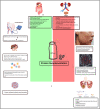Protein supplementation: the double-edged sword
- PMID: 38174000
- PMCID: PMC10761008
- DOI: 10.1080/08998280.2023.2280417
Protein supplementation: the double-edged sword
Abstract
Protein supplements are widely consumed by athletes as well as young adults and teenagers going to the gym and are an excellent source to increase protein intake, build muscle mass, and enhance recovery. They are available in the form of powders, gummies, protein bars, and ready-to-drink shakes and have been shown to have effects on almost every system in the body. Subjects consuming whey protein-based supplements regularly show significantly lower systolic blood pressure, while subjects who consume soy-based protein supplements have been reported to show a significant decrease in their systolic and diastolic blood pressures. Favorable effects of soy protein consumption have been observed on the serum lipid profile, with significant decreases in serum low-density lipoprotein and triglyceride levels. Lower postprandial glucose levels have been observed in diabetic subjects as well, which can be attributed to the lower glycemic index of these supplements. This can lead to an indirect decrease in diabetes-related complications. While these supplements affect the body positively, caution has to be exercised while consuming them in excess, as they have been shown to cause hyperfiltration and increased urinary calcium excretion which can, in turn, lead to chronic kidney disease development. This article focuses on the effects of protein supplementation on the human body, with emphasis on the cardiovascular, endocrine, and renal systems.
Keywords: Dietary supplements; exercise; soy protein; whey protein.
Copyright © 2023 Baylor University Medical Center.
Conflict of interest statement
The authors report no funding or conflicts of interest.
Figures
References
Publication types
LinkOut - more resources
Full Text Sources

